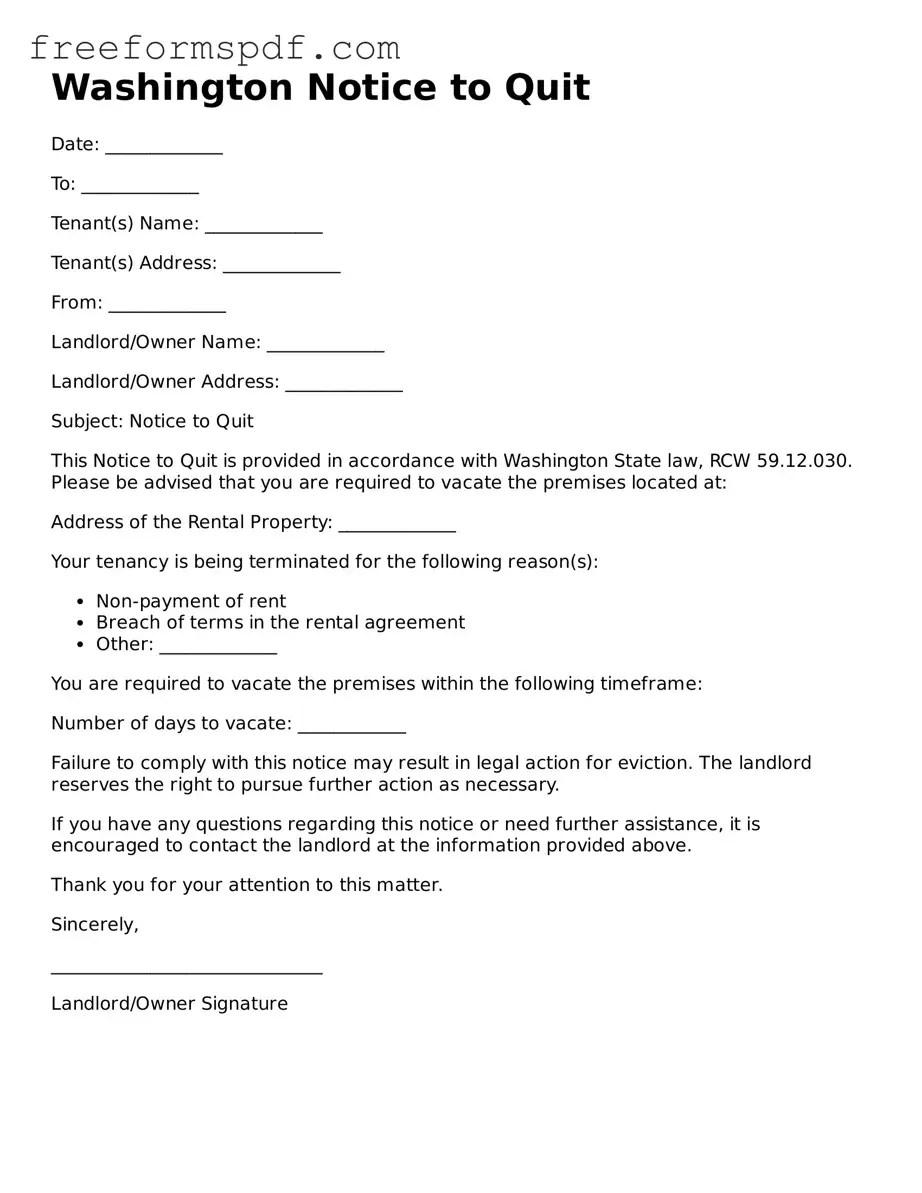Attorney-Verified Notice to Quit Document for Washington State
Common mistakes
-
Incomplete Information: Many people forget to fill in all required fields. Missing details like the tenant's name, address, or the date can lead to delays or complications.
-
Incorrect Dates: Using the wrong date can cause confusion. It’s crucial to ensure that the notice period complies with state laws and reflects the correct timeline.
-
Failure to Sign: Some individuals neglect to sign the form. A signature is necessary to validate the notice, and without it, the document may be deemed invalid.
-
Not Keeping Copies: After submitting the form, failing to keep a copy for personal records can be a significant oversight. Having a record is essential for future reference.
-
Ignoring Local Laws: Each jurisdiction may have specific requirements. Not being aware of local regulations can lead to mistakes that could affect the eviction process.
Learn More on This Form
-
What is a Washington Notice to Quit form?
The Washington Notice to Quit form is a legal document used by landlords to inform tenants that they must vacate the rental property. This notice is typically issued when a tenant has violated the terms of the lease agreement or has not paid rent. The form outlines the reason for the eviction and provides a timeline for the tenant to leave the premises.
-
When should a landlord use a Notice to Quit?
A landlord should use a Notice to Quit when a tenant has failed to comply with lease terms, such as not paying rent or violating specific rules outlined in the lease. It is important for landlords to follow the proper legal procedures to ensure the eviction process is valid.
-
What information must be included in the Notice to Quit?
The Notice to Quit must include several key pieces of information. This includes the tenant's name, the address of the rental property, the reason for the eviction, and the date by which the tenant must vacate the property. Additionally, it should specify any actions the tenant can take to remedy the situation, if applicable.
-
How much notice must be given to the tenant?
The required notice period can vary based on the reason for the eviction. Generally, for non-payment of rent, a landlord must provide a 14-day notice. For lease violations, the notice period may also be 10 days. It is essential to check local laws for specific requirements, as they can differ by jurisdiction.
-
Can a tenant contest a Notice to Quit?
Yes, a tenant has the right to contest a Notice to Quit. If a tenant believes the notice is unjust or that they have remedied the situation, they may respond to the landlord or seek legal assistance. It is advisable for tenants to act promptly to protect their rights.
-
What happens if the tenant does not comply with the Notice to Quit?
If the tenant does not comply with the Notice to Quit by the specified date, the landlord may initiate eviction proceedings. This typically involves filing a lawsuit in the appropriate court. It is crucial for landlords to follow the legal process to avoid potential complications.
-
Is a Notice to Quit the same as an eviction notice?
While a Notice to Quit is a type of eviction notice, it is not the final step in the eviction process. The Notice to Quit serves as a warning to the tenant, while an eviction notice is a formal legal action taken by the landlord if the tenant fails to vacate the property. Understanding the distinction is important for both landlords and tenants.
Misconceptions
There are several misconceptions surrounding the Washington Notice to Quit form. Understanding these can help clarify its purpose and use.
- Misconception 1: The Notice to Quit is the same as an eviction notice.
- Misconception 2: Tenants do not have any rights after receiving a Notice to Quit.
- Misconception 3: A Notice to Quit can be issued for any reason.
- Misconception 4: Once a Notice to Quit is given, the tenant must leave immediately.
- Misconception 5: Landlords do not need to provide a reason for the Notice to Quit.
This is not accurate. A Notice to Quit is a preliminary step that informs a tenant they must vacate the property. An eviction notice is a legal document that follows if the tenant does not comply.
This is incorrect. Tenants still have the right to respond and contest the notice. They can seek legal advice and may have options to negotiate or remain in the property.
This is misleading. In Washington, a Notice to Quit must be based on specific grounds, such as non-payment of rent or lease violations. It cannot be issued arbitrarily.
This is not true. The tenant typically has a set period to vacate, which varies depending on the reason for the notice. They cannot be forced to leave without following the proper legal process.
This is incorrect. Landlords must provide a valid reason that complies with state laws. Failure to do so may result in the notice being deemed invalid.
Some Other Notice to Quit State Templates
Quick Notice Letter - This document can specify conditions under which a tenant can remain on the property.
The New York Trailer Bill of Sale form is a document that records the details of a transaction where a trailer is sold from one person to another. It acts as a proof of purchase, ensuring both the seller's right to sell and the buyer's ownership are clear. This legal document is crucial for the registration or transfer of a trailer's title in New York, and you can find a useful template at newyorkform.com/free-trailer-bill-of-sale-template.
7 Day Notice to Quit - Ensures that tenants are given proper notice before legal proceedings.
Pa Eviction Laws in Winter - Complements other eviction forms when necessary.
Eviction Template - Understanding the requirements of a Notice to Quit helps streamline the eviction process.
